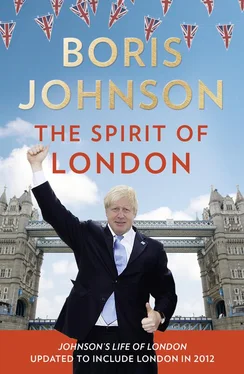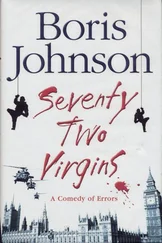By the time I get to cycle home, most of the morning crowds have tramped the other way. Like some gigantic undersea coelenterate, London has completed its spectacular daily act of respiration – sucking in millions of commuters from 7 am to 9 am, and then efficiently expelling them back to the suburbs and the Home Counties from 5 pm to 7 pm. But the drift home is more staggered. There are pubs, clubs and bars to be visited and as I watch the crowds of drinkers on the pavements – knots of people dissolving and reforming in a slow minuet – I can see why the city beats the countryside hands down. It’s the sheer range of opportunity.
You can exchange Dante/Beatrice glances on the Tube escalator; you can spill someone else’s latte and offer to buy them another; you can apologise when they tread on your toe, or you can get your dog lead tangled in theirs, or you can just collide with them on the pavement. You can even use the personal dating services in the evening paper or (I imagine this still goes on) you can offer to buy them a drink. These are some of the mating strategies of our species; but they have statistically a far higher likelihood of success in a city, because it is in the city where there are the numbers and the choice of potential mates – and the penalty for failure is much lower.
The metropolis is like a vast multinational reactor where Mr Quark and Miss Neutrino are moving the fastest and bumping into each other with the most exciting results. This is not just a question of romance or reproduction. It is about ideas. It is about the cross-pollination that is more likely to take place with a whole superswarm of bees rather than a few isolated hives.
You would expect me to say this, and I must of course acknowledge that many great cities can make all kinds of claims to primacy, but at a moment when it is perhaps excessively fashionable to be gloomy about Western civilisation I would tentatively suggest that London is just about the most culturally, technologically, politically and linguistically influential city of the last five hundred years. In fact, I don’t think even the Mayors of Paris, New York, Moscow, Berlin, Madrid, Tokyo, Beijing or Amsterdam would quibble when I say that London is – after Athens and Rome – the third most programmatic city in history.
Around the world there are similar crowds of commuters, tramping similar pavements with the same grim-jawed mood of economic competitiveness. They are wearing a London invention – the dark suit, with jacket, trousers and tie, that was pioneered by eighteenth-century dandies and refined by the Victorians. They travel on devices that were either invented or developed in London: underground trains (Paddington to Farringdon, 1855) or buses, or even bicycles, which were certainly popularised if not invented in London.
If they have just got off a plane, that machine will have been guided through the sky by air traffic controllers who are trained to speak a language that emerged in its modern form in the London of Geoffrey Chaucer.
They may make use of a cash machine (Enfield, 1967) before entering a department store (which appeared in its modern form in Oxford Street in 1909). When they get home the chances are they will slump in front of a television (the first example of which was turned on in a room above what is now Bar Italia in Frith Street, Soho, in 1925) and watch the football (whose rules were codified in a pub in Great Queen Street in 1863).
You know, I could keep it up for quite a while, this tub-thumping list of London innovations, from the machine gun to the Internet to the futures market for Château Haut-Brion. But the city’s contribution has also been spiritual and ideological. When Anglican missionaries fanned out across Africa, they carried the King James Bible, a masterpiece translated in London. When the Americans founded their great republic they were partly inspired by the anti-monarchical slogans of London radicals; and across the world there are governments that at least pay lip service to concepts of parliamentary democracy and habeas corpus that London did more than any other city to promote.
Darwinism originated in the English capital. So did Marxism. So did Thatcherism, come to that, and the anarcho-communism of Bromley resident Peter Kropotkin.
It was the vast pink patches of empire that did the most to allow Londoners to project themselves abroad, the Cambrian explosion of Victorian technology and energy. But the empire was no accident, and it was no sudden fluke that made London in 1800 the biggest and most powerful city on Earth. That imperial epoch was itself the product of centuries of evolution, and the Victorians inherited a conglomerate of advantages – a wonderfully flexible language, skill in banking, naval expertise, a stable political system – that previous Londoners had laid down.
A big city gives people the chance to find mates, money and food; and then there is one further thing that bright people come to London to find, one currency more dear to the human heart than money itself – and that is fame.
It was the eternal contest for reputation and prestige that encouraged Londoners to endow new hospitals or write great plays or crack the problem of longitude for the navy. No matter how agreeable your surroundings, you couldn’t get famous by sitting around in some village, and that is still true today. You need people to acknowledge what you have done; you need a gallery for the applause; and above all you need to know what everyone else is up to.
It is the city that gives the ambitious person the scope to eavesdrop, borrow or just intuit the ideas of others, and then to meld them with his own and come up with something new. And for the less ambitious, it is a chance to look busy and ingratiate yourself with the boss in the hope of avoiding the boot – because if someone is ‘working from home’ then I am afraid they are a great deal easier to sack.
These are some of the reasons why people have chosen not to stay at home with the cat; that is why there is the drumming migration over London Bridge. For centuries people have been coming not in search of oil or gold or any other natural wealth – because London has nothing but Pleistocene clay and mud – they have been coming in search of each other, and each other’s approbation. It is that competition for prestige that has so often produced the flashes of genius that have taken the city forwards – and sometimes the entire human race.
If you had come to London 10,000 years ago, you would have found nothing to distinguish the place from any other estuarial swamp in Europe. You might have found the odd mammoth looking lost and on the verge of extinction, but no human settlements. And for the next 10,000 years it was pretty much the same.
The civilisations of Babylon and Mohenjo-daro rose and fell. The Pharaohs built the pyramids. Homer sang. The Mexican Zapotecs began to write. Pericles adorned the Acropolis. The Chinese emperor called his terracotta army into being, the Roman republic endured a bloody civil war and then became an empire and in London there was silence save the flitting of deer between the trees.
The river was about four times wider than it is today, and much slower – but there was scarcely a coracle to be seen on the Thames. When the time came for Christ to preach his ministry in Galilee there were certainly a few proto-Britons living in a state of undress and illiteracy. But there were no Londoners. There was no big or lasting habitation on the site of the modern city, because there was no possibility of a settlement – not without that vital piece of transport infrastructure I use every day.
By my calculations, today’s London Bridge must be the twelfth or thirteenth incarnation of a structure that has been repeatedly bashed, broken, burned or bombed. It has been used to hurl witches into the Thames; it has been destroyed by Vikings; it has been torched at least twice by mobs of angry peasants.
Читать дальше












